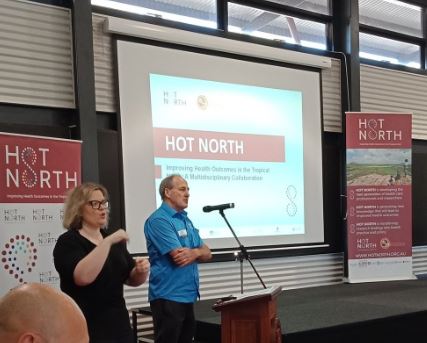Search
Research
Spatial codistribution of HIV, tuberculosis and malaria in EthiopiaHIV, tuberculosis (TB) and malaria are the three most important infectious diseases in Ethiopia, and sub-Saharan Africa. Understanding the spatial codistribution of these diseases is critical for designing geographically targeted and integrated disease control programmes. This study investigated the spatial overlap and drivers of HIV, TB and malaria prevalence in Ethiopia.
Research
Infectious complications and optimising infection prevention for children with cochlear implantsTo describe the clinical epidemiology of children receiving cochlear implants, as well as the management and outcomes of cochlear implant infections and adherence to infection prevention measures.
Research
See, Treat, Prevent Skin Sores and Scabies (SToP) TrialHealthy skin is important for maintaining overall health and wellbeing. Some skin infections, if untreated, can lead to serious downstream health complications such as heart disease, kidney disease, or sepsis.
Research
Skin health situational analysis to inform skin disease control programs for the KimberleyThe aim of this project is to conduct a situational analysis of the skin health services and activities currently available for managing skin infections within the Kimberley.
Research
Skin MicrobiomeThe skin is home to an array of bacteria, fungi and viruses, which together make up the skin microbiome. We explore how the skin microbiome can contribute to healthy skin.
Research
SNAP-Chat: the Staphylococcus aureus Network Adaptive Platform Trial (SNAP) - ChatDr Anita Asha Campbell Bowen MBBS, DCH, PG DipPID, FRACP, PhD BA MBBS DCH FRACP PhD GAICD FAHMS OAM Infectious Diseases Physician; Raine Clinician
Research
Moorditj Marp (Strong Skin) Evaluation and development of culturally relevant healthy skin storybooksCo-designed and in collaboration with community members, the impacts of this project will directly benefit families by building awareness, empowering decision-making, and improving confidence around the recognition and management of skin conditions for Aboriginal children.

News & Events
Expert researchers converge on Broome to tackle health challenges in Northern AustraliaOver 100 researchers and health professionals from around Australia have united in Broome this week to address the major health battles facing people living in the tropical north of the country.
Research
Antimicrobial Resistance in Enterobacterales, Acinetobacter spp. and Pseudomonas aeruginosa Isolates From Bloodstream Infections in Australian Children, 2013–2021Gram-negative bloodstream infections are associated with significant morbidity and mortality in children. Increasing antimicrobial resistance (AMR) is reported globally, yet efforts to track pediatric AMR at a national level over time are lacking.
Research
Australian Group on Antimicrobial Research surveillance outcome programs - bloodstream infections and antimicrobial resistance patterns from patients less than 18 years of ageFrom 1 January 2020 to 31 December 2021, thirty-eight institutions across Australia submitted data to the Australian Group on Antimicrobial Resistance (AGAR) from patients aged < 18 years (AGAR-Kids). Over the two years, 1,679 isolates were reported from 1,611 patients. This AGAR-Kids report aims to describe the population of children and adolescents with bacteraemia reported to AGAR and the proportion of resistant isolates.
